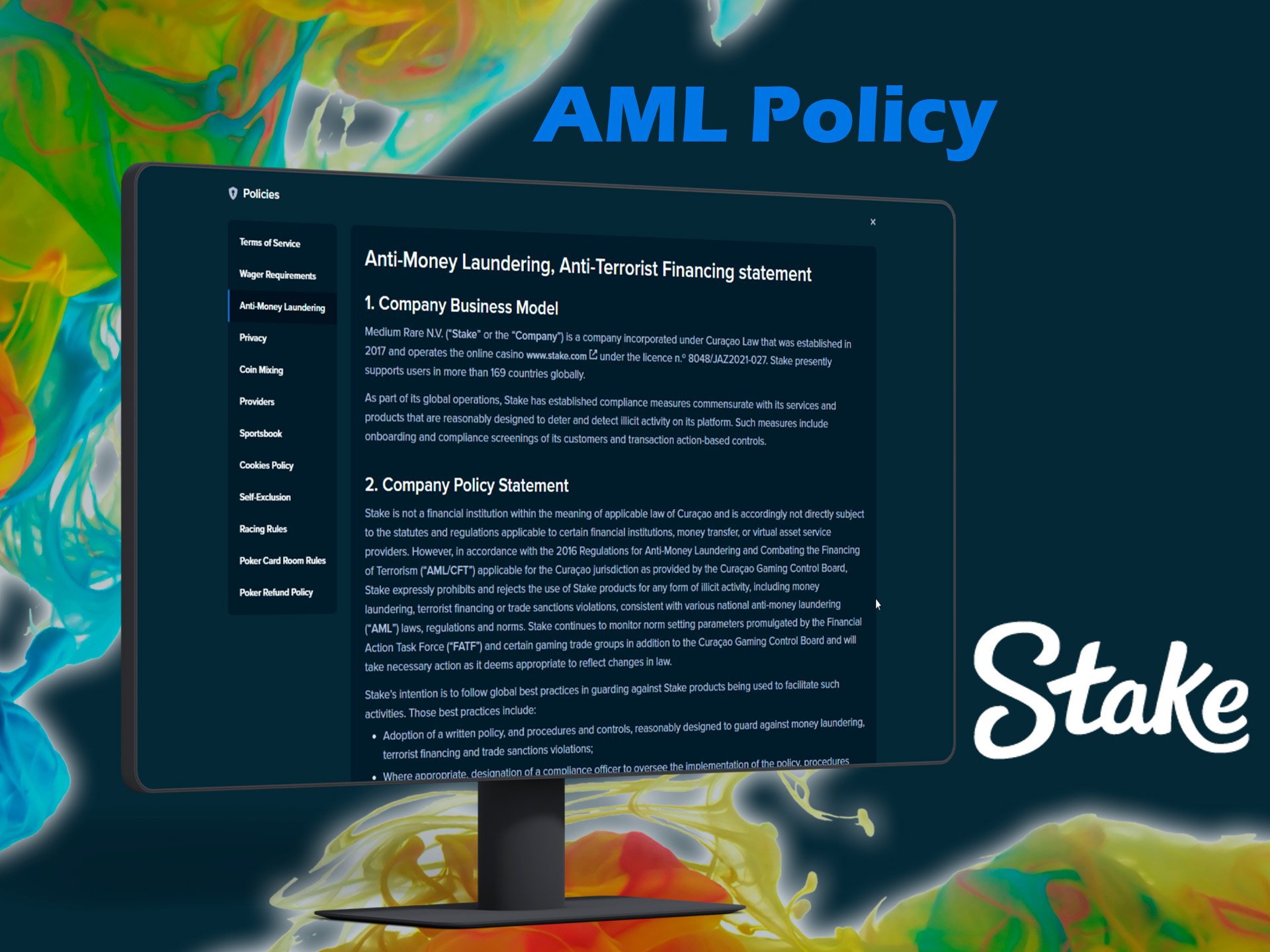AML Policy
1. Company Business Model
Medium Rare N.V., known as “Stake” or the “Company,” is a business registered under the laws of Curaçao, established in 2017, and operates the online gaming site www.stake.com under license number 8048/JAZ2021-027. Stake serves users across over 169 countries worldwide.

In its global operations, Stake has implemented compliance protocols appropriate to its services and products, aimed at preventing and identifying unlawful activities on its platform. These include initial and ongoing compliance assessments of its clients and transaction monitoring systems.
2. Company Policy Statement
While Stake is not classified as a financial institution under Curaçao law and is not directly governed by the laws and regulations that affect financial entities, money transmitters, or virtual asset service providers, it adheres to the 2016 Anti-Money Laundering and Counter-Terrorism Financing Regulations (“AML/CFT”) set forth by the Curaçao Gaming Control Board. Stake firmly prohibits the use of its products for any illegal activities such as money laundering, financing of terrorism, or breaches of trade sanctions, in line with multiple national AML statutes, guidelines, and standards. Stake actively stays updated with regulations established by the Financial Action Task Force (“FATF”) and various gaming industry groups, in addition to guidance from the Curaçao Gaming Control Board, and adapts its policies accordingly to accommodate legal changes.
Stake is committed to adhering to international best practices to prevent its products from being exploited for illegal purposes. These best practices include:
- Establishing a comprehensive written policy and procedures to prevent money laundering, terrorist financing, and violations of trade sanctions;
- Appointing a compliance officer responsible for enforcing these policies and procedures;
- Offering ongoing training and education to relevant employees;
- Conducting independent audits to review and enhance the policies, procedures, and controls as necessary.
3. Definitions
The terms defined below are commonly used within the industry:
- Money Laundering: The act of disguising the origins of money obtained illegally, typically through three main stages: placement, layering, and integration.
a) Placement: Introducing illicit funds into the financial system via banks or other financial entities, either through deposits or other methods.
b) Layering: The separation of ill-gotten gains from their sources through a series of complex financial transactions like converting cash into traveler’s checks, money orders, wire transfers, and investing in assets like stocks and bonds.
c) Integration: The final stage where laundered money is reintroduced into the legitimate economy, appearing as normal business earnings.
- Suspicious Activity: Actions by a user or non-user of a financial institution that suggest the transaction may be linked to fraudulent or illegal activities.
- Sanctions: Measures imposed by international bodies to restrict or penalize activities of a target, such as a country or regime, to:
a) Encourage behavioral change or compliance with international norms;
b) Leverage pressure to conform to specific objectives;
c) Act as a deterrent in scenarios where international peace is at risk and diplomatic measures have failed;
d) Prevent or halt funding for terrorist activities or groups.
4. Governance and Oversight
Stake has designated a Chief Compliance Officer (CCO) responsible for overseeing and implementing the Anti-Money Laundering (AML) policies and procedures. The CCO’s responsibilities also encompass developing AML strategies, collaborating with stakeholders to update AML protocols, adapting to new regulatory demands, and investigating any suspicious or unusual financial activities. Additionally, Stake commits to regular AML training for all employees to ensure compliance and awareness across the organization.
5. Know Your Customer and Transaction Monitoring
Know Your Customer
A. Customer Due Diligence
Stake implements a risk-based Customer Due Diligence (CDD) approach to understand the purpose and nature of customer relationships with the Stake platform and to develop a risk profile for each user. This involves collecting both documentary and non-documentary information during account creation, tailored to the type of account and services offered by Stake. Different CDD standards apply depending on the account and service types.
For example, CDD involves participants undergoing Stake’s Customer Identification Program (CIP), which includes:
- Collecting basic information (e.g., wallet address, email address) through Stake’s user onboarding portal;
- Monitoring risk profiles linked to the cryptocurrency wallets funding the accounts;
- Keeping records of identification information; and
- Verifying whether users are listed on any known or suspected terrorist or terrorist organization lists provided to financial institutions.
These processes are supported by:
- Identity and Age Verification: Third-party services validate the legitimacy of provided identification and KYC materials, ensure the user is not from a sanctioned or restricted jurisdiction, and check global sanctions lists using onboarding details like wallet addresses.
- Customer Information: Stake gathers detailed information to confidently know its users’ identities in line with their risk profiles. This can include wallet address, name, address, country, date of birth, or postal code. This information is collected before issuing a Stake funding address like a QR code. Currently, Stake does not serve non-natural persons and may depend on another institution to perform parts of the CIP.
Geo-blocking Measures:
- For Prohibited Jurisdictions: Stake ensures through contractual agreements that no gaming services are offered in regions where prohibited, utilizing IP address-based geo-blocking.
- For Sanctioned Jurisdictions: Stake requires contractual client certifications confirming that users are not subject to sanctions or watch lists from the U.S., EU, or other global bodies, verifying these claims through IP-based geo-blocking.
- Contractual Prohibitions for Users from Prohibited Jurisdictions: Users are informed during onboarding that Stake’s services are not available in restricted areas, based on Stake’s risk assessments, fraud prevention, and AML standards.
B. Enhanced Due Diligence and Ongoing Monitoring
Stake conducts ongoing monitoring to identify any suspicious behavior indicative of money laundering or terrorism financing. Stake utilizes specific red flag indicators to identify such behavior, which may lead to enhanced due diligence measures including:
- Full legal name;
- Country of citizenship;
- Permanent address;
- Identification number (e.g., taxpayer ID, passport number);
- Identification document; and
- Sources of Funds and Wealth.
Third-party services may be used to verify these details to ensure a thorough understanding of the user’s identity when suspicious activities are detected.
C. Acceptance Policy
Stake will not accept or will block users who:
- Fail to provide required identification information;
- Submit fraudulent identification documents;
- Misrepresent their location using various methods;
- Are from restricted or prohibited jurisdictions;
- Are subject to sanctions or global watch lists;
- Exhibit signs of gambling addiction or mental health issues;
- Have funds originating from or exchanged in restricted jurisdictions;
- Stake reserves the right to block or suspend accounts for any other reasons at its discretion.
Transactions Monitoring
Stake is dedicated to adhering to economic and trade sanctions programs enforced by jurisdictions where the company operates. To support this commitment, Stake has established a robust transaction monitoring program equipped with controls and processes designed to identify and respond to unusual activities both in real-time and through ongoing surveillance.
Continuous Monitoring and Detection
Stake engages in continuous monitoring using a combination of in-house developed rule-based systems and third-party tools to analyze user history and transaction patterns. This ongoing scrutiny helps to identify, report, and manage any unusual activities and to refine and enhance the controls or restrictions on its platform.
Procedures for Managing Unusual or Suspicious Activities
Stake’s strategy for handling unusual or suspicious activities includes:
Identification of Unusual Activities: This involves various methods such as feedback from employees and customers, law enforcement inquiries, external referrals, or reports from transaction and surveillance monitoring systems.
Alert Management: Focuses on the protocols for investigating, assessing, and documenting any unusual or potentially suspicious activities identified.
Operational Processes
To achieve effective monitoring and compliance, Stake employs several key processes:
- Transaction Monitoring for Sanctioned or Prohibited Jurisdictions: Stake may apply specific due diligence measures during user balance withdrawals and employ both manual and automated monitoring techniques to identify “red flag” behaviors. Suspicious activities may lead to refusal of transaction processing or additional information requests from the user. Efforts are made to restrict any account funding attempts from prohibited jurisdictions, using indicators such as wallet addresses linked to sanctioned locations.
- Screening for Sanctioned Parties: Before assigning a funding address to a user, Stake screens the user’s wallet address against relevant sanctions databases using third-party blockchain forensics services like Chainalysis, with periodic re-screening.
- Identification of Unusual Activity: Stake monitors accounts for transactions that are unusual in size, volume, pattern, or type, considering risk factors specific to the business. Regular reviews and reports help identify high-risk or suspicious activities.
- Anti-Mixing Measures: Stake uses software to detect and address suspicious deposit or withdrawal patterns. Users involved in such transactions may need to provide additional explanations about their actions and intentions.
- Chainalysis Review: Every crypto transaction, whether direct or indirect, is analyzed through Chainalysis for signs of fraud or suspicious behavior. Accounts flagged for potential illicit activity are suspended for further review, and high-risk accounts may be required to provide proof of wealth.
- Withdrawal Threshold KYC: Accounts reaching a specified withdrawal threshold, which varies based on the risk profile accumulated over the account’s lifespan, will undergo thorough KYC verification before any further transactions are allowed.
These measures collectively ensure Stake’s compliance with legal standards while safeguarding against financial crimes and misuse of its platform.
D. Other Ongoing Monitoring Controls
In addition to the previously outlined controls, Stake has introduced several supplementary procedures to bolster its know your customer (KYC) and ongoing monitoring protocols:
- Ban Evasion Detection: Stake employs third-party software to identify users operating multiple accounts from the same devices. Each case is evaluated based on the associated risk level, and users may be asked to justify their use of the platform. Stake prohibits peer-to-peer transfers within its system, and any attempt to bypass this rule is considered a serious violation.
- Time Zone Monitoring: To counteract attempts at geo-spoofing, Stake has implemented time zone monitoring to correlate device information with restricted jurisdictions and detect discrepancies that may indicate the use of location-hiding technologies.
- Products and Services Review: Stake continuously updates its procedures to prevent misuse of its services. This includes setting limitations on the types of assets that can be introduced to the platform and explicitly banning the use of anonymity-enhancing technologies like mixers and tumblers. Any detected use of such technologies will result in disallowed activity on the Stake platform.
- Vendor Management: Stake engages with reputable third-party service providers to bolster its compliance framework. Regular assessments are conducted to ensure these providers meet Stake’s standards and contractual obligations, with adjustments made as necessary to maintain compliance integrity.
- Compliance Innovation: Stake is committed to exploring innovative compliance solutions, including non-documentary methods and blockchain-native tools such as on-chain KYC providers and fraud prevention services. Trials may be conducted to evaluate the effectiveness of these technologies in supporting compliance efforts.
6. Education and Training
Under the guidance of its legal counsel and overseen by the Chief Compliance Officer (CCO), Stake provides its employees with periodic training in anti-money laundering (AML), anti-terrorist financing, and compliance with trade sanctions. This training is tailored to reflect the current regulatory landscape and operational requirements.
7. Reporting
In line with the National Ordinance, Stake is required to report any unusual or suspicious transactions. This includes reporting customers who are identified as being on sanctions lists or linked to money laundering, terrorist financing, or other criminal activities, marking them as suspicious activities to regulatory authorities.
